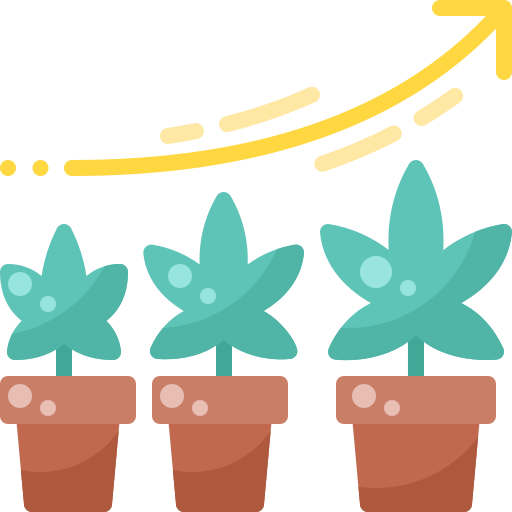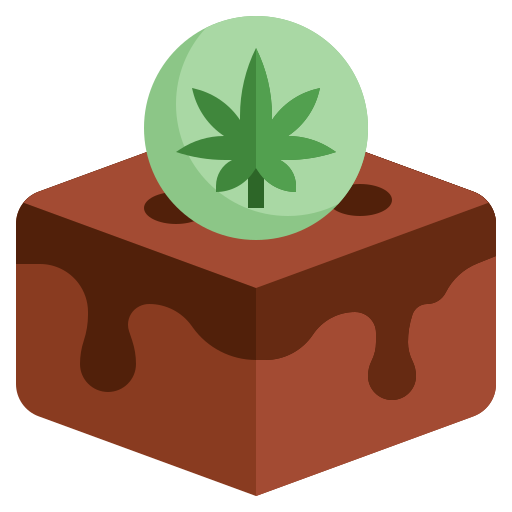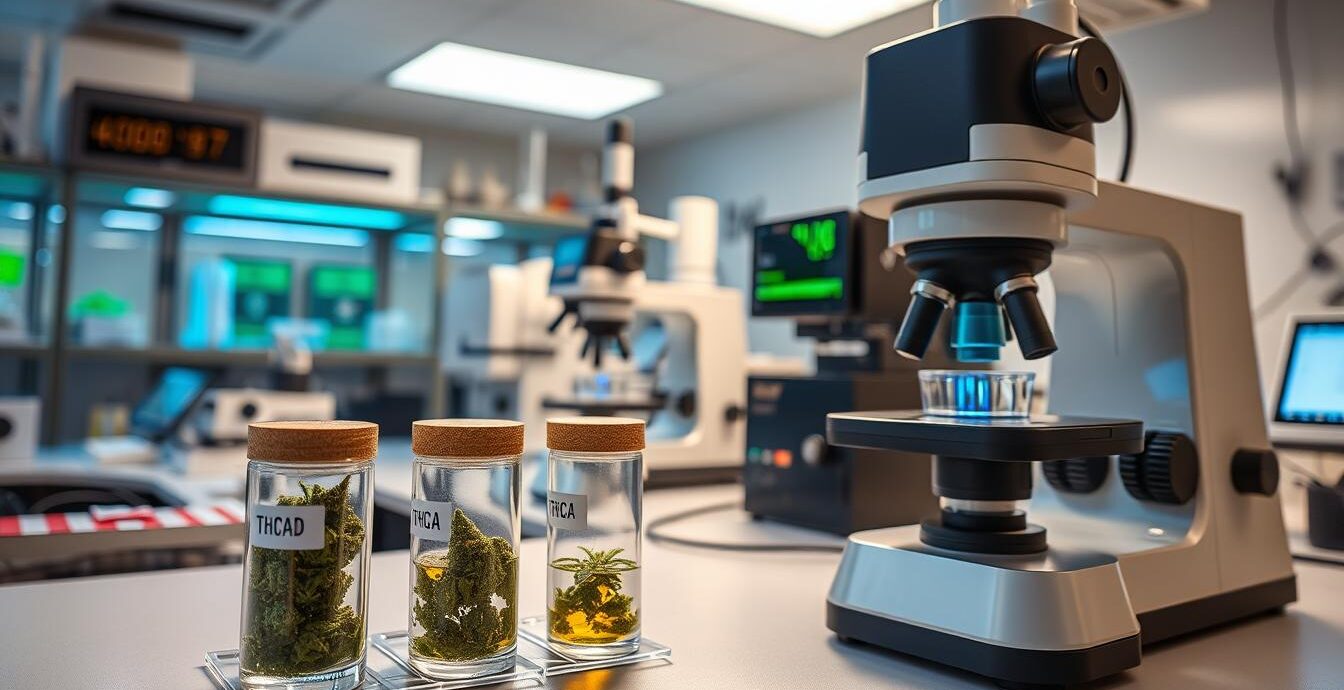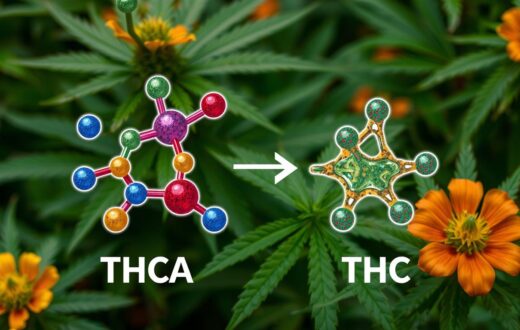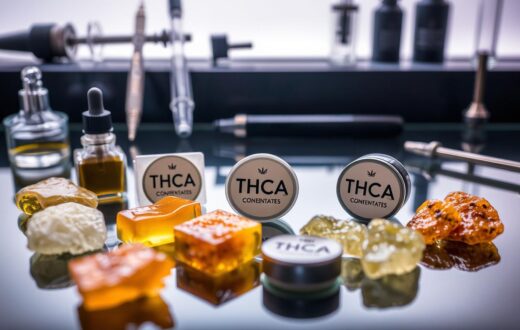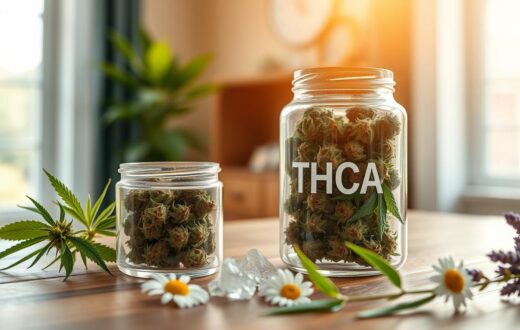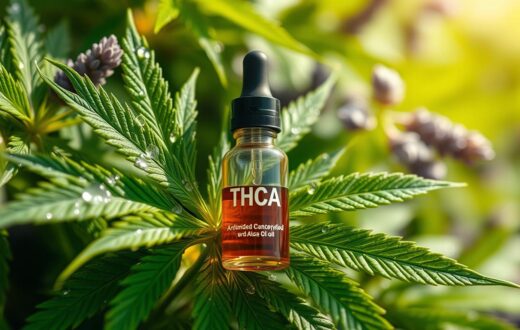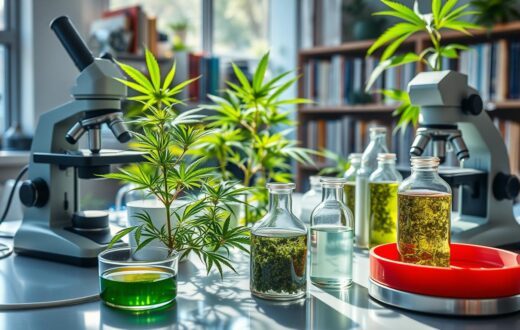Ever wondered why your cannabis product comes with a detailed lab report? It’s not just fancy packaging – these lab tests for THCA are crucial for your safety and satisfaction. But what exactly is THCA, and why does it matter?
THCA, or tetrahydrocannabinolic acid, is the non-psychoactive precursor to THC found in raw cannabis. Understanding its presence through cannabis potency testing is key to grasping the full potential of your product. Lab tests reveal the THCA content, which transforms into THC when heated – a process called decarboxylation.
Cannabinoid profiling goes beyond just THCA. It’s a comprehensive look at the plant’s chemical makeup. For instance, a Certificate of Analysis (COA) for Marshmallow OG 4 showed 23.5% THCa, with trace amounts of other cannabinoids. This detailed breakdown helps you make informed choices about your cannabis use.
These tests aren’t just about potency. They’re your shield against contaminants like microbials, heavy metals, and pesticides. By prioritizing transparency, reputable companies share their COAs, often through QR codes or web links on product packaging.
So next time you’re at a dispensary, don’t shy away from asking about lab results. Your budtender can help decode the COA, ensuring you get a product that’s not only potent but safe. Remember, knowledge is power – especially when it comes to what you’re putting in your body.
Understanding THCA: What Is It?
THCA, or tetrahydrocannabinolic acid, is a key part of raw cannabis plants. It’s found in lots in fresh cannabis flowers. As the plant dries, THCA levels go down. THCA turns into THC, the compound that makes you feel high.
This link between THCA and THC is key in testing cannabis for compliance and analyzing terpenes.
The Difference Between THCA and THC
THCA and THC are different cannabinoids with unique properties. THCA doesn’t make you high when it’s raw. But when it’s heated, it turns into THC.
This change happens when cannabis is smoked, vaped, or cooked. It’s then that you feel the effects of marijuana.
Importance of Cannabinoids in Cannabis
Cannabinoids like THCA are crucial in the cannabis plant. They help with potential health benefits, like reducing inflammation and protecting the brain. THCA might help with arthritis and brain diseases, studies suggest.
This shows why it’s important to test cannabis thoroughly. It helps us understand all the cannabinoids in cannabis products.
Common Misconceptions About THCA
Many think THCA makes you feel high like THC. But THCA doesn’t unless it’s heated and turns into THC. Another myth is that all THCA turns into THC when heated.
In reality, only about 87.7% of THCA turns during decarboxylation. Knowing this is key for both users and producers in the cannabis world. It shows the need for accurate testing and analysis.
The Role of Lab Tests in Cannabis Quality Assurance
Lab tests are key to ensuring cannabis products are safe and of good quality. With 39 states allowing medical marijuana and 22 states for recreational use, testing is more important than ever. These tests help measure THC and CBD levels, giving users the facts about what they’re consuming.
Ensuring Safety for Consumers
Cannabis lab tests do more than just check for strength. They also look for harmful substances like pesticides, heavy metals, and bacteria. Modern Canna, a top testing lab, checks for over 70 contaminants and heavy metals like arsenic and lead. This detailed testing protects users from harmful products.
The Process of Lab Testing Explained
The testing journey begins with collecting the right samples. Since July 1, 2023, the cannabis industry must use approved sampling firms. These firms must meet strict guidelines.
After samples are gathered, they are analyzed in detail. Modern Canna, for instance, tests for more than 20 cannabinoids and 40 terpenes. They also check for viruses like Hop Latent Viroid. This careful process ensures accurate THC and CBD levels, giving a full safety report on the product.
Key Components of THCA Lab Tests
Lab testing services are vital for ensuring cannabis products are safe and of good quality. These tests look at several important aspects of THCA-rich products. They give valuable info to both makers and buyers.
Testing for Potency Levels
Potency testing is key in cannabis safety. It checks the amount of THCA and other cannabinoids in a product. For products like snowballs, the potency is usually between 30% and 50%.
Lab reports also figure out the potential THC after decarboxylation. They use this formula: Total THC = THC + (THCa × 0.877).
Identifying Contaminants
Cannabis safety testing also checks for harmful stuff. Lab reports show if there are microbes, heavy metals, toxins, or solvents. This info is key for making sure products are pure and safe to use.
Also, federal law says hemp products must have less than 0.3% delta-9 THC. These tests check this rule.
Terpene Profile Analysis
Lab tests also look at the terpene profile of cannabis products. This tells us about the product’s smell and possible effects. Detailed reports show the exact amounts of cannabinoids and terpenes.
By using these parts of THCA lab tests, companies can make sure their products are legal and of high quality. Buyers get access to safe, quality cannabis products. They have reliable scientific data to back it up.
How THCA Lab Tests Ensure Compliance
THCA lab tests are key in the cannabis world. They make sure products follow rules and give accurate info to buyers. In the U.S., following state laws is vital for those in the cannabis business.
Regulatory Standards in the U.S.
States have their own rules for testing cannabis. For example, the USDA’s hemp rules led states like Florida and New York to make their own. The National Hemp Compliance Panel checks for things like cannabinoids and pesticides to keep things in line.
Importance for Producers and Distributors
For those making and selling cannabis, lab tests are essential. They keep products up to standard and help stay legal. ACS Laboratory, for instance, checks up to 30 cannabinoids in cannabis using LCMS.
They use a special formula to figure out THC levels. This formula is: THCtotal = (%THCA) x 0.877 + (%THC). It’s important for labeling and following state rules.
Testing methods differ based on the product. For edibles and extracts, Ultra-High-Performance Liquid Chromatography is used. The GC method doesn’t work for THC edibles, so labs often use the LC method for better results.
Choosing the Right Lab for THCA Testing
Finding a reliable lab for THCA testing is crucial for product safety and quality. The cannabis industry faces issues like fake THC levels and hidden contaminants. It’s important to pick a lab that values accuracy and follows the rules.
Accreditation and Certifications to Look For
When picking a lab, make sure it has the right accreditation and certifications. Look for labs that follow strict standards, like those in California to fight fake THC levels. Before these rules, THC levels were often too high, but now they’re more realistic.
Evaluating Lab Testing Methods
Check how the lab tests for cannabinoids and terpenes. Good labs use advanced methods like High-Performance Liquid Chromatography (HPLC) or Gas Chromatography (GC). These methods give accurate results for potency and safety.
In Michigan, where lots of cannabis is sold, 0.5% of each batch is tested for safety and potency. Be careful of labs that might lie about THC levels or ignore contaminants. Some states, like Michigan, are fighting this by investing in state labs to check private lab results.
The Impact of Lab Testing on Consumer Trust
Lab testing is key to building trust in the cannabis industry. It ensures products are safe and of good quality. This affects how people view a brand. As the market expands, knowing the THC levels in products becomes more important.
Building Brand Reputation
Brands that focus on lab testing stand out. But, some labs might not always be honest. This can lead to higher THC levels, which can be risky.
Lab shopping, where labs inflate THC levels, is a big issue. It can make THC levels seem 28% higher. This can harm consumers and damage trust in the industry.
Consumer Education and Awareness
Teaching people about lab testing is crucial. In Florida, labs must check eleven cannabinoids in products. This helps consumers make better choices.
Knowing the THC and CBD levels helps users pick the right products. This could be for pain, anxiety, or other health issues. As people learn more, they’ll want more accurate lab tests. This will push the industry to improve.
Common Lab Testing Methods for THCA
Lab testing is key for checking cannabis and CBD quality. High-Performance Liquid Chromatography (HPLC) and Gas Chromatography (GC) are the main methods for testing THCA. Let’s explore how these techniques work and why they’re vital.
High-Performance Liquid Chromatography (HPLC)
HPLC is the top choice for testing THCA. It’s favored because it doesn’t use heat. This means it can accurately measure THCA without it turning into THC. Labs use HPLC to check the levels of various cannabinoids. This ensures products are legal and safe for use.
Gas Chromatography (GC)
GC is another common method, but it works differently. It uses heat to analyze samples, which changes THCA into THC. This makes it harder to accurately measure the initial THCA levels. Some states have rules to ensure all labs use the same method. For example, California has guidelines for standardizing testing.
Both methods are crucial for ensuring cannabis product quality and safety. They help labs provide accurate information about what’s in cannabis products. This helps consumers make better choices.
Understanding Lab Test Results
Lab testing services are key in the cannabis world. They give detailed info on product makeup through Certificates of Analysis (COAs). These documents have important data for both users and experts to know.
Reading and Interpreting Certificates of Analysis
COAs from THCA lab tests give a lot of info. They show THC and THCA percentages, CBD levels, terpene profiles, and contaminants. To find total THC, use this formula: THCtotal = (%THCA) x 0.877 + (%THC). This helps understand the product’s strength.
Common Measurements You Should Know
When looking at lab test results, pay attention to key measurements. THC and THCA percentages show psychoactive effects. CBD content hints at health benefits. Terpene profiles affect taste and effects. Contaminant levels ensure safety. Remember, THCA isn’t psychoactive on its own but turns to THC when heated.
Lab testing services use various methods to check cannabis products. Gas chromatography (GC) and liquid chromatography (LC) are used to tell THCA from THC. For edibles, LC is better than GC. Knowing these measurements and methods helps you choose cannabis products wisely.
The Future of THCA Lab Testing
Cannabis testing is changing fast, with new trends leading the way. As people want to know more about what they buy, labs are getting better at testing. The future of testing THCA looks bright, with new ways to test more accurately and quickly.
Trends Shaping the Industry
One big change is the push for standard testing across labs. This ensures everyone gets the same results. Another trend is focusing more on THCA levels in hemp products. The 2018 Farm Bill says hemp can’t have more than 0.3% THC, but some places might count THCA too.
This could really change the hemp industry, possibly affecting billions of dollars in sales.
Innovations in Testing Technology
New tech is changing how we test cannabis. High-performance liquid chromatography (HPLC) is getting better, making tests faster and more accurate. Some labs are even using artificial intelligence to check results, cutting down on mistakes.
These new tools aim to give results quicker without losing accuracy. They meet the growing need for reliable information on THCA and other cannabinoids.
Cost Considerations for THCA Lab Tests
Lab testing for THCA is key for quality and safety. Prices vary based on the lab’s reputation and analysis depth. We’ll look at how to compare prices and understand the value of testing.
Comparing Prices from Different Labs
When looking for lab testing services, don’t just focus on price. Cheaper options might lack accuracy or completeness. High-quality labs charge more for their advanced equipment and expertise.
For example, terpene analysis adds to the cost but gives valuable insights into the product’s profile.
Understanding the Value of Testing
THCA lab testing offers more than just compliance. It gives vital info on product quality and safety. For producers, investing in thorough testing leads to better products and stronger customer trust.
Consumers get to know exactly what’s in their cannabis. While saving money on testing might be tempting, the long-term benefits of accurate analysis are worth it.
Lab tests show harmful contaminants and give precise data on cannabinoids. This info is crucial for both medical and recreational users. Remember, reputable suppliers provide Certificates of Analysis (COAs) to ensure product cleanliness and effectiveness.
When evaluating costs, consider that higher-quality, lab-tested products are pricier but safer and more potent.
Educational Resources for THCA Lab Testing
Learning about THCA lab testing is key for cannabis pros and users. Knowing how to measure THC and verify CBD content is vital. This ensures products are safe and of good quality. Let’s look at some great educational resources.
Recommended Websites and Literature
State cannabis control boards have great info on lab testing rules. Scientific journals on cannabis research dive deep into testing methods. The National Institute of Standards and Technology (NIST) website is a top spot for learning about cannabis testing standards.
Online Courses and Workshops
Experts and schools offer online courses on cannabis testing. These cover topics like HPLC and GC for precise THC measurement. Workshops by ACS Laboratory and New Bloom Labs give hands-on COA interpretation skills.
The cannabis world is changing fast. Keeping up with new testing methods, like the 4-AP test, is crucial. By using these resources, you’ll learn a lot about CBD verification and cannabis testing.
Legal Implications of THCA Lab Testing
The legal world of THCA lab testing is quite complex. The 2018 Farm Bill made hemp products with less than 0.3% THC legal. This change allowed THCA flower sales in many places. Testing for cannabis safety is very important in this market.
State and Federal Regulations
Each state has its own rules. In Pennsylvania, you can buy THCA flower but there are THC limits. Texas has made its rules stricter. But California and Colorado are more relaxed. Lab testing makes sure products are legal.
Consequences of Neglecting Testing
Not testing can cause big problems. Companies might face fines or lose their licenses. Buyers could get products that aren’t safe. Brands like Diamond CBD and CBD Mall always test their products. This builds trust and keeps everyone safe.
THCA flower doesn’t get you high when it’s raw. But it turns into THC when heated. So, accurate lab testing is crucial. It helps buyers know what they’re getting. It also keeps businesses following the law. In the growing THCA market, lab testing is essential for success and safety.
Conclusion: The Essential Nature of THCA Lab Tests
THCA lab tests are key in the cannabis world. They make sure products are safe and strong. These tests help us know what’s in our cannabis, guiding our choices.
THCA is the most common non-psychoactive part of cannabis. Knowing it and how it might turn into THC is very important.
Summary of Key Points
Testing shows that cannabis with 15% or more THCA is very potent. Strains like Gorilla Glue, OG Kush, and Sour Diesel are known for their high THCA levels. Tests using Gas Chromatography and Liquid Chromatography check THCA and THC levels.
These tests also find any bad stuff and look at terpene profiles. This all helps make sure the product is good quality.
Call to Action for Responsible Cannabis Use
We should always choose cannabis that has been tested well. Buying from places that test their products shows we care about quality and safety. It’s important to learn how to read lab test results and understand THCA’s role.
Being smart about cannabis starts with knowing the facts. Let’s make choices based on accurate, scientific information.
